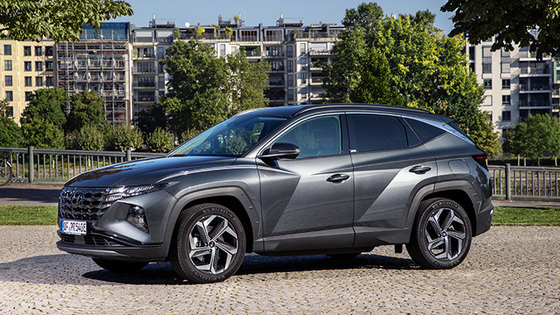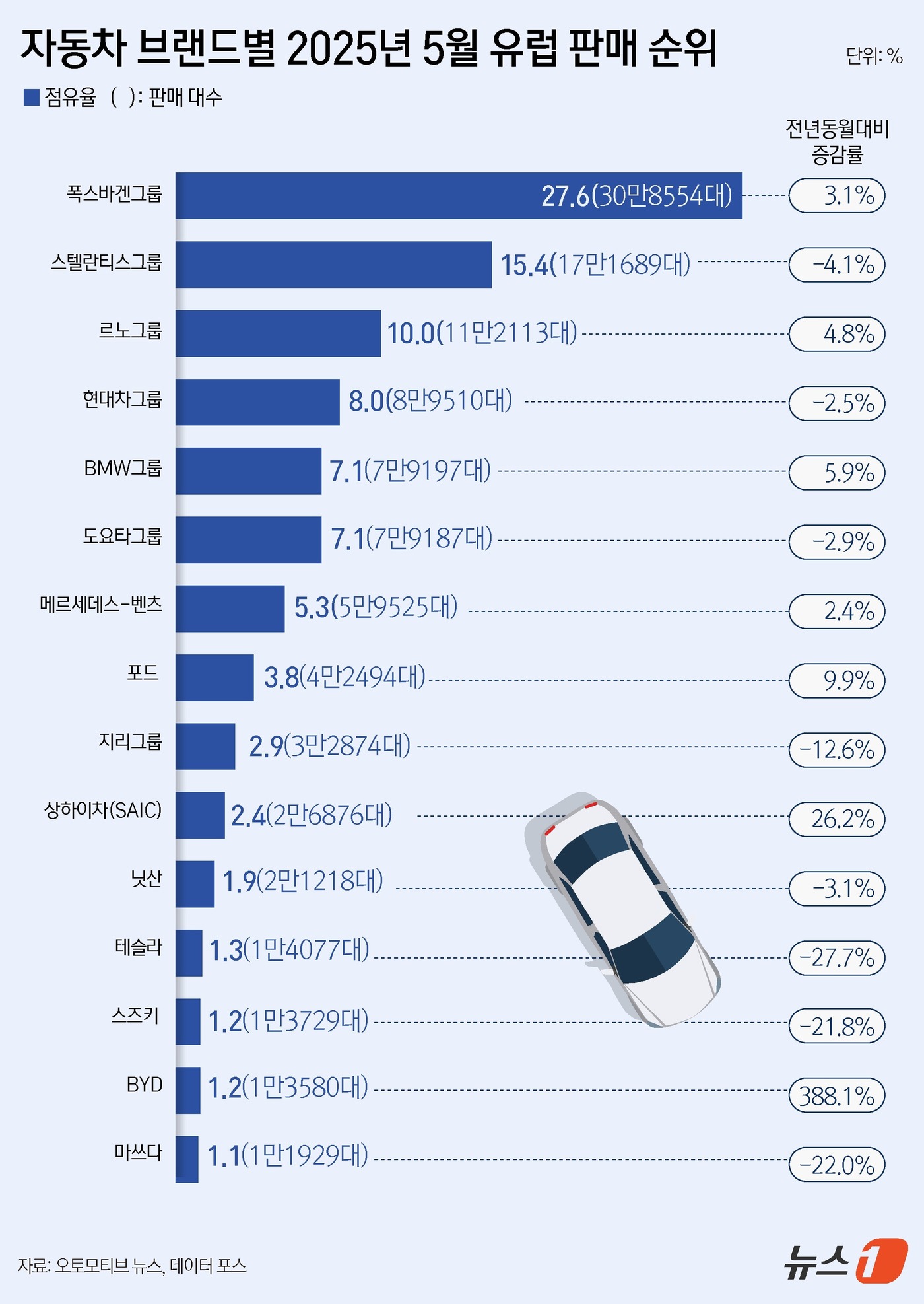Hyundai and Kia's sales in Europe have slowed... Weak PHEV lineup has been painful.
In May, the European new car market increased by 1.3%... Hyundai and Kia sales dropped by 2.5%. Growth was driven by a 46.1% increase in PHEV sales... Mercedes with 17 models versus Hyundai with 2 models.
 (Seoul=UD News) By Kim Seongsik = As this year has progressed, criticism has emerged that Hyundai Motor (005380) and Kia (000270) have been struggling in the European market due to a lack of plug-in hybrid (PHEV) models. Despite recent increases in PHEV sales, Hyundai and Kia only offer 6 PHEV models.
(Seoul=UD News) By Kim Seongsik = As this year has progressed, criticism has emerged that Hyundai Motor (005380) and Kia (000270) have been struggling in the European market due to a lack of plug-in hybrid (PHEV) models. Despite recent increases in PHEV sales, Hyundai and Kia only offer 6 PHEV models.
In particular, it is burdensome for Hyundai and Kia that Chinese manufacturers are focusing on selling PHEVs to avoid the high tariffs imposed on BEVs.
In May, European car sales increased by 1.3%... Hyundai and Kia sold 89,000 vehicles, a 2.5% decrease. Cumulative sales also decreased by 2.2%.
According to Automotive News and automotive research firm DataForce on the 27th, Hyundai Motor and Kia sold 89,000 units in the European new car market in May this year, a 2.5% decrease compared to the same period last year. During the same period, the total sales of new cars in Europe increased by 1.3% to 1,116,000 units. This marks the second consecutive month of growth after three consecutive months of decline in the market.
As a result, Hyundai Motor and Kia's market share of new car sales in Europe last month fell by 0.3 percentage points compared to the same period last year, recording 8.0%. In terms of sales ranking, they came in 4th after △Volkswagen Group (27.6%), △Stellantis Group (15.4%), and △Renault Group (10.0%). The two companies have maintained their 4th place ranking since they achieved it in 2021, holding it for four consecutive years up until last year.
Based on the cumulative sales volume from January to May this year, Hyundai and Kia are showing signs of slowing in Europe. During this period, Hyundai and Kia sold 450,000 units, a decrease of 2.2% compared to the same period last year. In the same period, European car sales maintained last year's level at 5.59 million units. As a result, the market share of the two companies fell by 0.2 percentage points compared to the same period last year, recording 8.0%.

'PHEV 13 models' BMW, overtakes Toyota, ranks 5th in sales... Chinese cars also suffer from 'tariff bomb', fighting for survival in PHEV
The European new car market is being driven by PHEVs. According to the European Automobile Manufacturers Association (ACEA), last month PHEV sales surged by 46.1% to 108,000 units compared to the same period last year. Compared to declining sales of △gasoline (300,000 units, -19.5%) △diesel (91,000 units, -27.6%), as well as other environmentally friendly vehicles such as △battery electric vehicles (BEVs, 193,000 units, +27.2%) and △hybrid electric vehicles (HEVs, 379,000 units, +14.2%), the growth of PHEVs stands out.
PHEV is a vehicle that combines the advantages of BEV and internal combustion engine vehicles. Unlike regular HEVs, PHEVs can be charged externally, making them closer to BEVs. However, unlike BEVs, they have an engine, so when the charged electricity is used up, they can drive using the engine power. The reduced charging burden and significantly increased range are also advantages. As these advantages become more prominent, PHEVs are being recognized as an alternative to BEVs among European consumers. Last month, the PHEV market share rose to 9.7%, surpassing diesel (8.1%) for the first time in history.
Domestically, Hyundai and Kia do not sell PHEV models, but in Europe, they offer PHEV models. Hyundai sells two types: the Tucson and Santa Fe, while Kia sells four types: the Ceed, Niro, Sportage, and Sorento. However, compared to local competitors like Volkswagen (6 models), BMW (13 models), and Mercedes-Benz (17 models), they are somewhat lacking. These companies actually sell PHEV models across all vehicle types, from hatchbacks and sedans to SUVs.
Thanks to the popularity of PHEVs, Volkswagen sold 308,000 units in Europe last month, a 3.1% increase compared to the same period last year, widening the gap with second-place Stellantis Group. During the same period, BMW Group's sales increased by 5.9% to 79,000 units, ranking it 5th. Mercedes-Benz, which maintained its 7th position, also saw an increase in sales by 2.4%. In contrast, Toyota Group, with only two PHEV models, the Prius and RAV4, experienced a 2.9% decrease in sales, narrowly falling behind BMW Group to rank 6th.
Chinese electric vehicle companies are also increasing their market share in the European market by leveraging PHEVs. As a result of Chinese electric vehicle companies staking their survival on PHEV exports after the European Union (EU) raised tariffs on Chinese-made BEVs to a maximum of 45.3% last year due to unfair competition concerns. The BYD's "Seal U" claimed the top spot in the PHEV segment in Europe last month by selling over 6,000 units, outperforming Volkswagen's "Tiguan" and Volvo's "XC60". BYD's sales in Europe last month reached 13,000 units, with a year-over-year growth rate of 388%.
seongskim@news1.kr
Copyright ⓒ UD News. All rights reserved. Unauthorized reproduction and redistribution, and use for AI learning are prohibited.
▶ "Having sex here?"... Teenagers commit condom terrorism at sushi restaurant
▶ "My girlfriend is pregnant but my parents are against our marriage... She wants to terminate the pregnancy and get married a year later."
▶ "40s rejected blind date with 4-year older person... 'Don't know the subject' scolded"
Post a Comment